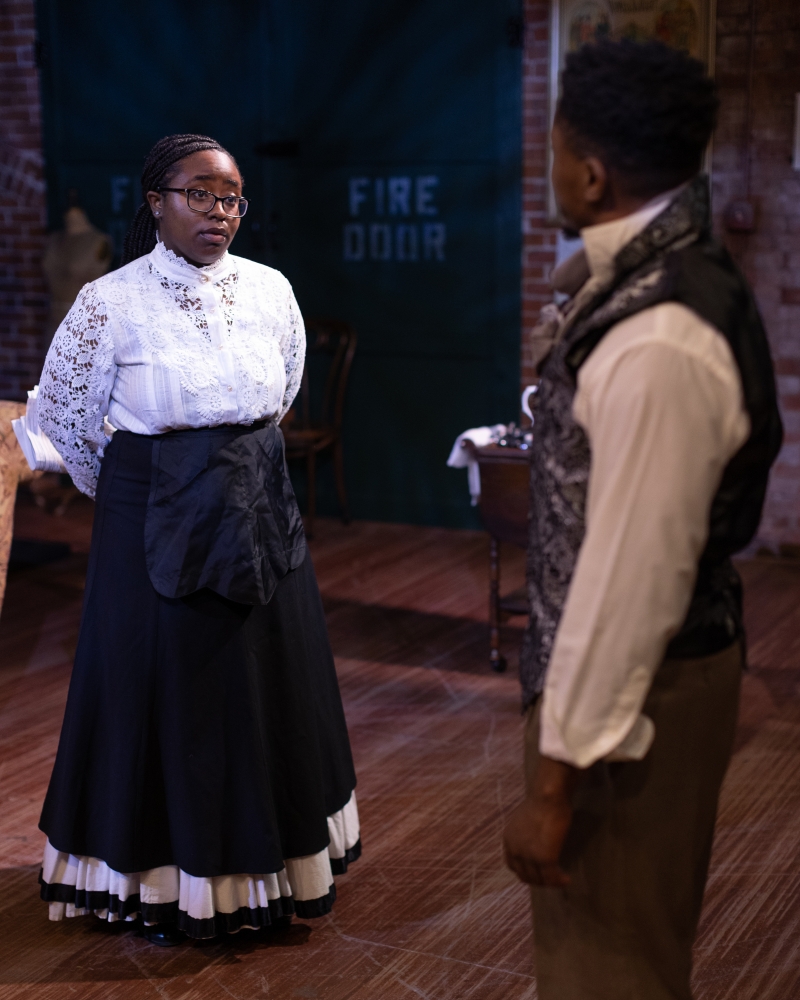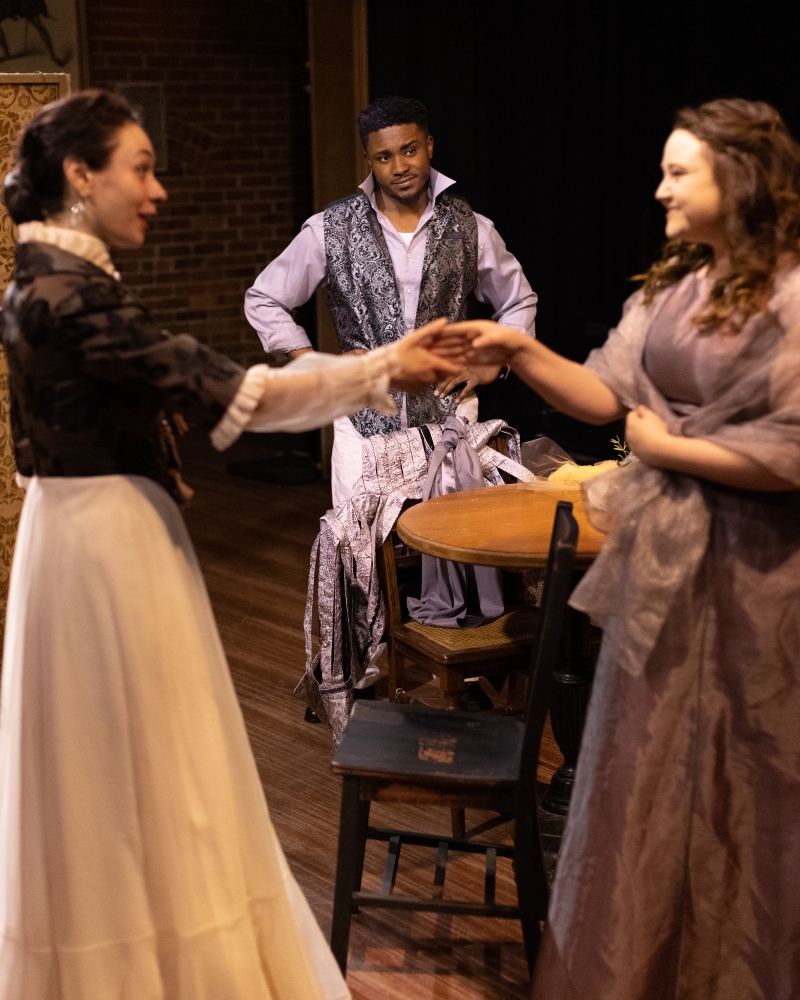Review: RED VELVET At Burbage Theatre Company
A riveting backstage view of a major episode in theater history.

Why, reporter Halina (Gabrielle McCauley) demands to know, has the legendary Shakespearean actor Ira Aldridge (JāQuan Malik Jones) not returned to the London stage since his appearance in Othello, thirty-four years earlier?
Halina is asking an important question—one that Aldridge has no intention of answering. Yet he allows her to stay with him a while, perhaps reminded of his younger self by her combination of charm, passion, willfulness, and need. As they verbally spar, we realize that Aldridge carries emotional wounds from his time in London. What story does he hide, we now ask with Halina?
Lolita Chakrabarti’s Red Velvet is her attempt to answer that question, a play that fleshes out historical events with an imaginative reconstruction of what happened behind the plush curtains of the Covent Garden Theatre Royal. His reputation as a “luminous” talent, to pluck a word from the play, preceded the then twenty-six Ira Aldridge.
His hiring by French manager Pierre (David Sackal) should have looked providential in the company's dire circumstances. Their star actor, Edmund Kean, had collapsed onstage a few days prior, leaving actors apprehensive for their futures and concerned for Kean’s son and stage-heir presumptive Charles (Liam Roberts). The abolition debate igniting street protests in London also inflamed the actors’ discussions, pitting Henry (Zach Gibb) and his humanistic principles against the unfeeling traditionalism of Bernard (Andrew Stigler).
When Aldridge walks in the room where the actors are gathered, he unites them all briefly—in stupefaction at his being Black. The outside world, with its tensions, has entered a company some actors see as a refuge from reality.
They quickly discover that Aldridge brings even greater change with him, his naturalistic style of acting thrilling some of them and upsetting others. Here stands a revolutionary thespian who brings his full humanity to the stage and invites others to do the same, instead of pandering to audience expectations. That is a lot to take in, and the actors reveal much about themselves in how they navigate this situation under the watchful eyes of Connie (Sabrina Youn), the company’s Jamaican maid and the audience’s representative on the stage.

As Connie says of the newspapers’ vicious reviews of Aldridge’s performance, “People see what them a look fo’.” While she means that a Black man could not expect to get a fair review in 1833 London, the line offers a challenge to the audience: what are we seeing on the Burbage stage?
Chakrabarti often focuses our attention on the racism Aldridge faced, as seen in her selection of negative reviews he received, but she goes beyond that. The play also raises complex questions about the social role of the theater, the prices of ambition, and the interplay between popular audiences, actors, cultural elites, and capital. Are we willing to consider these questions, too? And are we so in thrall with the lead that we forget the supporting characters that allow him to burn with such intensity?
The intimacy of the Burbage Theatre lends itself well to this questioning of the audience’s role, and director Jackie Davis builds in subtle moments of connection between the audience and the play with touches ranging from fourth-wall breaking looks to clever plays with stage elements—a doorjamb, a mirror frame—that direct the spectators’ eyes to moments of unspoken communication between the women in Aldridge’s life.

And it is well worth watching this cast interact, as they reveal their characters’ humanity in their exchanges. Jones demonstrates an impressive range as Aldridge, seamlessly transitioning from a Lear-like imperious old man still demanding adoration on the brink of death to a 26-year-old offstage tactician and seducer who forgets petty calculations onstage. His exchanges with Halina, played with urgent vivacity by McCauley, crackle with subtext, as does his one meaningful conversation with Connie, whom Youn endows with unnervingly fatalistic wisdom.
Watching Alison Russo embody the company’s lead actress, Ellen, as she—there is no other word—“nerds out” about acting with Aldridge is a moment of pure vicarious jubilation. Russo is also excellent when she attempts to deflect the small-mindedness and jealousy of her fiancé Charles, whose petty complacency Liam Roberts plays to excellent comic effect.
Her choices remain unspoken whereas David Sackal as Pierre, the company’s French manager, delivers a forceful argument for compromise with despised systems. It is a difficult case to make on a stage, but Sackal conveys Pierre’s good intentions and disappointment with a sincerity that lends him conviction.
For all this heartfelt dialogue, perhaps the most touching moment of the play is a simple handshake Stigler imbues with sheer human decency where one expects it least. To discover what brings this moment about, the audience should attend the highly recommended Red Velvet at the Burbage Theatre, showing for a very limited run through June 18th.
Tickets available at https://www.burbagetheatre.org/boxoffice or call the box office at 401-484-0355.
Reader Reviews

Videos

